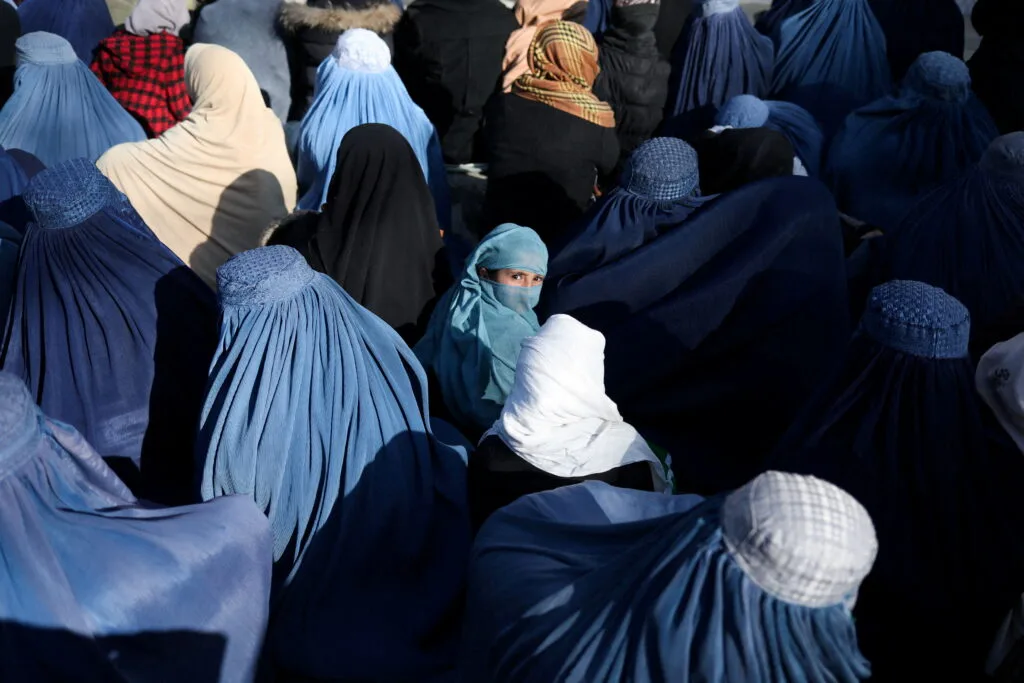New Undercover Documentary Reveals Taliban’s Crackdown on Women in Afghanistan

July 19, 2022
Share
Afghanistan Undercover Tues., Aug. 9, 2022 Airing at 10/9c on PBS & on YouTube Streaming at 7/6c at pbs.org/frontline & in the PBS Video App facebook.com/frontline | Twitter: @frontlinepbs | Instagram: @frontlinepbs | youtube.com/frontline
When the Taliban seized control of Afghanistan amid the U.S. withdrawal in August 2021, the hardline group told the world that its government would respect women’s rights. Afghanistan Undercover, a new FRONTLINE documentary filmed on the ground in Afghanistan over the past year, uncovers a different — and harrowing — story.
“We found evidence of women jailed by the Taliban without trial and held in secret,” says award-winning journalist and correspondent Ramita Navai (Syria Undercover, Iraq Uncovered). “Of girls abducted from their homes and forcibly married. Of women living in hiding, and in fear for their lives, with those who speak out risking imprisonment.”
In Afghanistan Undercover, premiering Tues., Aug 9, on PBS (check local listings), Navai powerfully exposes harsh realities for women under the Taliban’s rule — finding those being punished by the regime, and confronting Taliban officials. She secretly films in a jail where she discovers women being held by the Taliban without trial or charge, their fate often unknown to their families: “Just say to the whole world, they don’t let us talk,” one young woman tells Navai before a guard intervenes.
Navai meets with a group of female lawyers, banned from working by the Taliban. She accompanies an underground network of female activists on dangerous missions to rescue women trying to escape the Taliban and bring them to secret safehouses. She uncovers evidence of Taliban soldiers forcibly marrying young girls, despite the regime announcing the practice was forbidden. And she speaks with women in abusive marriages who have attempted to end their own lives since the Taliban took over.
“It’s due to increased mental pressure on women at home,” a doctor who treats these patients tells Navai. “They can’t speak up to defend themselves. There’s no law to protect them.”
Often filmed undercover, Navai’s footage shows the regime’s control of women’s lives tightening, with a number of the defiant voices in the documentary ultimately being forced into hiding, arrested or fleeing abroad: “We are living in so much fear,” says a former major in the Afghan army who is on the run from the Taliban.
In an interview with Navai, a Taliban representative calls claims of the regime’s mistreatment of women “baseless,” and says, “Other countries should not impose on us what is good for them. We have our own culture, interests and values. The international community must allow us to build our own government.”
Despite the dangers they face for speaking out, some women in the country refuse to stop advocating for their rights.
“This is the road I have chosen,” one young woman protester tells Navai. “I have three younger sisters. If I don’t raise my voice for them, they too will be broken.”
###
Credits
Afghanistan Undercover is a Quicksilver Media production for GBH/FRONTLINE in association with ITV. The producer and director is Karim Shah. The correspondent is Ramita Navai. The executive producers for Quicksilver Media are Eamonn Matthews and Ramita Navai. The executive producer for FRONTLINE is Raney Aronson-Rath.
About FRONTLINE FRONTLINE, U.S. television’s longest running investigative documentary series, explores the issues of our times through powerful storytelling. FRONTLINE has won every major journalism and broadcasting award, including 100 Emmy Awards and 28 Peabody Awards. Visit pbs.org/frontline and follow us on Twitter, Facebook, Instagram and YouTube to learn more. FRONTLINE is produced at GBH in Boston and is broadcast nationwide on PBS. Funding for FRONTLINE is provided through the support of PBS viewers and by the Corporation for Public Broadcasting. Additional support for FRONTLINE is provided by the Abrams Foundation, the John D. and Catherine T. MacArthur Foundation, Park Foundation; and the FRONTLINE Journalism Fund, with major support from Jon and Jo Ann Hagler on behalf of the Jon L. Hagler Foundation, and additional support from Koo and Patricia Yuen, and Suzanne and Mark Colodny.
FRONTLINE Press Contact: Anne Husted, FRONTLINE, Manager, Public Relations and Communications frontlinemedia@wgbh.org | 6173005312
Latest Documentaries
Explore
Policies
Teacher Center
Funding for FRONTLINE is provided through the support of PBS viewers and by the Corporation for Public Broadcasting, with major support from Ford Foundation. Additional funding is provided the Abrams Foundation, Park Foundation, John D. and Catherine T. MacArthur Foundation, Heising-Simons Foundation, and the FRONTLINE Trust, with major support from Jon and Jo Ann Hagler on behalf of the Jon L. Hagler Foundation, and additional support from Koo and Patricia Yuen. FRONTLINE is a registered trademark of WGBH Educational Foundation. Web Site Copyright ©1995-2025 WGBH Educational Foundation. PBS is a 501(c)(3) not-for-profit organization.



















